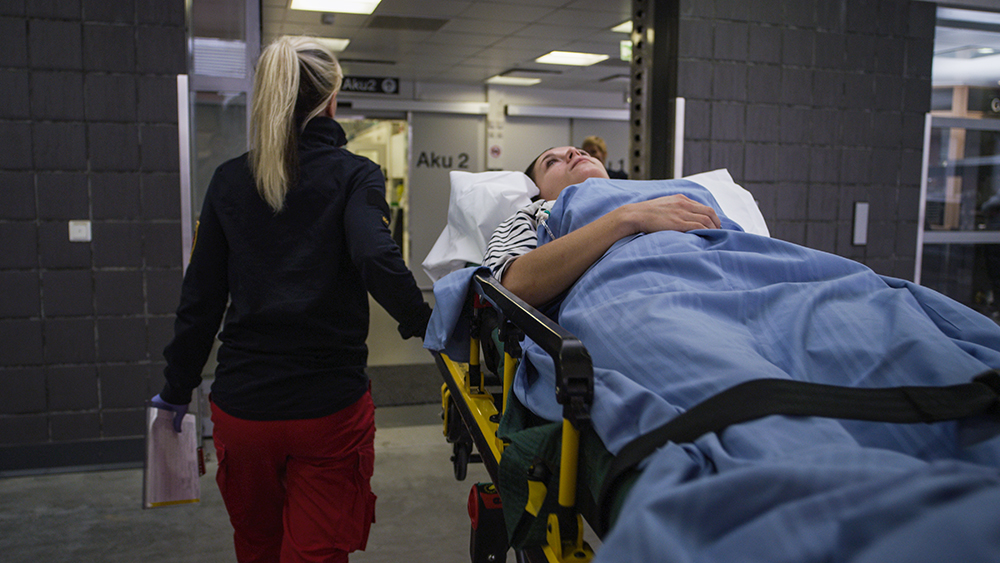Medical helpline 116117 or emergency number 112 – which should I call?

Recently, there have been reports of long lines in health services and the role of the general medical helpline 116117. Here's what you should know about when to call the emergency number or the medical helpline.
The medical helpline 116117 is an advisory service organised by wellbeing services counties that provides instruction on sudden health problems. You should call the medical helpline before going to the emergency room. In the medical helpline, healthcare professionals will tell you if the situation requires a visit to the emergency room. If self-care at home is sufficient, you will also receive reliable home care instructions.
“In a life-threatening situation, you should always call the emergency number. These include, for example, severe chest pain, difficulties breathing, unconsciousness, symptoms of paralysis or sudden convulsions. You should call 112 in all these situations,” says Ari Ekstrand, Head of Division at the Emergency Response Centre Agency.
The general medical helpline assists in all situations that are urgent but not actual emergencies. These include aches and pains that cannot be treated at home. If the medical helpline devices that the situation requires emergency medical services, the caller can be instructed to call the emergency number. In some regions, the call can also be transferred, in which case it is important for the caller to stay on the line until the call has been picked up by the emergency response centre. In any situation, it is important to listen and follow the instructions given.
Learn to identify what is an emergency
As services become more diverse, it is important to keep the most important thing in mind: in case of an emergency, you should immediately call the emergency number. If the situation is not an emergency but it is a sudden health problem, you should call the medical helpline. If, after a risk assessment, the emergency response centre operator instructs you to call the medical helpline, this means that the operator has evaluated that non-emergency care is the best help in the situation, such as an assessment of the need for urgent care or the emergency room. This does not mean that you are denied access to treatment, but simply that the situation does not require alerting emergency medical care. Emergency care should primarily be reserved for serious injuries and accidents.
- The 112Suomi mobile app has an extensive range of services and a wide range of emergency numbers. Be sure to activate the app after downloading it and familiarise yourself with the services beforehand. Launching the app does not automatically open an emergency call to the response centre,” Ekstrand says.
The medical helpline is available 24/7 in urgent health problems. There are regional differences in how the medical helpline operates. Check the instructions for your region on the webpage for the meidical helpline.
Medical helpline 116117 provides advice on sudden health problems, information about out-of-hours services and referrals to social services.
Emergency number 112 assists in emergencies for which you need urgent assistance from the authorities (police, paramedics, fire department, social services).
Call 112 if you know or suspect that somebody’s life, health or property or the environment is threatened or in danger
See also
Distress may turn to joy in a call involving childbirth
ERC operators provide instructions on what to do at the scene of an accident
Emergencies and problem situations abroad – This is what you should do
Number of emergency calls at a low point
In 2025, an average of 7,300 emergency calls were made to the emergency number every day. The number of assignments relayed to authorities took an upward turn.
Fear of Being Stigmatized Prevents Young People from Calling for Help
During adolescence, risk taking and peer pressure are often heightened, and sometimes situations can escalate into danger. The aim of the 112 Day campaign is to strengthen young men’s ability to recognize emergencies and encourage them to act.
Demanding ERC operator work requires extra investment in wellbeing at work
Paula has been working for the Emergency Response Centre Agency for ten years: first as a communications specialist for nine years and then as a wellbeing at work specialist from the start of 2024. By looking after staff wellbeing, she feels that she is doing meaningful work and is able to indirectly contribute to the safety of Finland as a whole.
Reputation of the Emergency Response Centre Agency remains strong
According to the Reputation&Trust study, the reputation of the Emergency Response Centre Agency is ranked fourth among public administration agencies. The public felt that the Agency performed best in the responsibility and products and services dimensions.
Wellbeing is built together
Competent, committed and content staff are the Emergency Response Centre Agency's most important asset and strategic priority. The Agency’s new wellbeing at work programme places greater emphasis on developing competence in work capacity management and career management, among other things.



